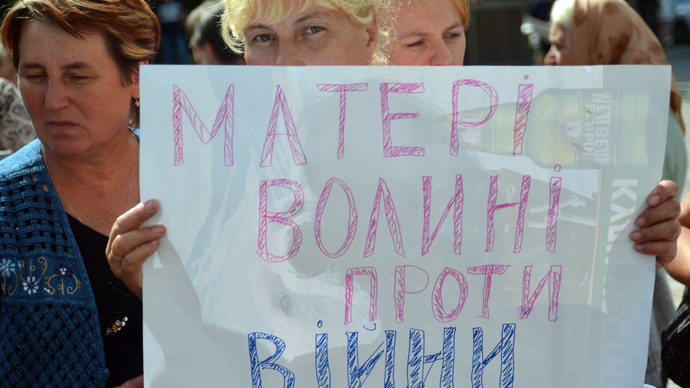5yrs for ‘denying Russian aggression’: Ukraine may criminalize anti-war speech

A bill submitted by an MP from President Poroshenko’s party in the Ukrainian parliament seeks to criminalize public speech that reject the government’s narrative on the civil war, which it describes as a Russian military invasion.
The controversial bill amends the Ukrainian criminal code to make “public denial or justification of the Russian military aggression against Ukraine in 2014-2015” a felony.
The ‘crime’ would carry a penalty ranging from a heavy fine and up to a five-year jail term for repeat offences or convicts who held public office.
If the bill is signed into law, it would be the latest move to attack civil freedoms by Ukraine’s post-coup government defending its security policies from criticism.
Last week a Ukrainian court ordered the two-month detention of a journalist from western Ukraine who called for a boycott of the ongoing military draft. Ruslan Kotsaba stated that he would rather spend two to five years in prison for refusing to serve in the military than shoot at Ukrainians in what he described as a ‘fratricidal war’. Prosecutors charged him with high treason, a crime carrying a 15-year term in Ukraine.
READ MORE: Ukrainian reporter ‘charged with high treason’ after calls to dodge draft
The prosecution of Kotsaba was sharply criticized by Amnesty International, which labeled him a ‘prisoner of conscience’ and demanded his immediate release.
Amnesty International назвала украинского журналиста Руслана Коцабу узником совести #ukraine#атоhttp://t.co/ew3pXCeRD9 via @Amnestyrus
— Amnesty Russia (@amnestyrus) February 11, 2015
“Ruslan Kotsaba’s position may be viewed differently. But by arresting him for making his position public, the Ukrainian authorities violate the basic human right for freedom of expression, which the Ukrainians had been defending at the Maidan,” Tatyana Mazur, head of Amnesty’s Ukrainian branch, said in a statement.
In a separate incident, Anton Gerashchenko an aide to the Ukrainian interior minister threatened opponents of the military draft that any person taking part in last week’s anti-war rally in Mariupol would be detained, identified and fingerprinted.
Очередная истерика в Соц сетях. Завтра в Мариуполе призывают на митинг против мобилизации. Караул ! Могу всех успо.. https://t.co/xSx58deUwT
— Антон Геращенко (@Gerashchenko7) February 8, 2015
On Tuesday, President Petro Poroshenko defended the crackdown on anti-war protesters in Ukraine. He told the cabinet that Ukraine’s Security Service (SBU) had arrested 19 people who campaigned against the military draft.
“The SBU has discovered a den of rogues involved in anti-Ukrainian activity. As of today, they grabbed 19 active critics of the mobilization by their private parts,” the Ukrainian leader said as cited by Ukrainskaya Pravda newspaper.
He described the critics as “so-called journalists and activists, who pose a threat equal to that posed by the enemy at the front” and whose campaigning “has nothing to do with democracy and freedom of speech.”
Kiev claims that rather than waging a military crackdown against Ukrainian anti-government rebel forces that didn’t accept the post-coup government it is fighting a stealth invasion of Russian mercenaries and regular troops. On several occasions top Ukrainian officials reported defeating units of the Russian armed forces, but each time they failed to produce conclusive evidence of the allegations for international scrutiny.
Moscow denies sending heavy arms or regular troops to eastern Ukraine, although it admits that a number of Russian citizens went to join the rebels as volunteers. Russia also opposes moves by Kiev that it believes would escalate the violence. Ukrainian young men dodging conscription have been offered refuge in Russia.












